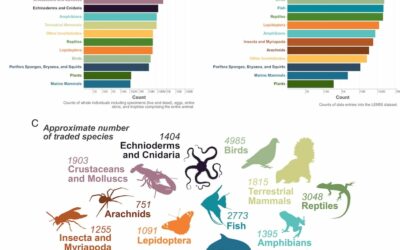This post was originally published on WBCSD
This impact story is part of a series featuring companies that are members of One Planet Business for Biodiversity (OP2B)/WBCSD. Through these stories, we aim to showcase our members’ commitment to driving the transition to regenerative agricultural practices, the impact on farmers and the role OP2B plays in supporting this transformation.
Diageo, a global leader in the beverage industry, has woven sustainability into its operations, aligning business success with environmental stewardship. Ewan Andrew, Diageo’s Global President of Supply & Procurement, emphasizes: “We’ve believed in sustainable practices since the inception of our brands. It’s culturally ingrained.” This approach not only benefits the environment but also enhances business efficiency and profitability.
Objectives and targets
Diageo’s sustainability plan, “Spirit of Progress” highlights its commitment to environmental and social responsibility. The plan promotes moderation in alcohol consumption, drives inclusion and diversity and pioneers sustainability from production to consumer. Diageo aims for net-zero carbon emissions by 2050, with interim targets of net-zero operations and a 50% reduction in supply chain emissions by 2030.
Diageo’s commitment to regenerative agriculture, supported by OP2B, reflects a comprehensive approach to sustainability that balances environmental stewardship with economic growth. “We’re implementing these scale programs – not pilots – because time is against us,” Andrew explains. These programs are open-sourced, fostering radical transparency within competition laws and helping reduce market volatility while securing crop purchases.
Water stewardship is a core focus of Diageo’s sustainability efforts. “Water is strategically one of the most important resources we consider,” Andrew explained, noting its critical role in producing raw materials.

Impact of regenerative agriculture
In Ireland, Diageo runs a project, launched in 2022, involving over 40 farms growing barley for Guinness. The project focuses on enhancing soil health, boosting biodiversity, reducing synthetic fertilizer use and improving water quality. This initiative is part of the broader goal to scale regenerative practices across key agricultural landscapes.
Walter Furlong, a farmer in County Wexford, Southeast Ireland, shares his experience with the project: “The regenerative practices we’ve adopted have made our enterprise more profitable and environmentally friendly – a win-win,” he remarks. The project enables farmers to measure emissions more accurately and implement small, impactful changes, such as reducing carbon emissions and lowering fertilizer costs.
In practical terms, the project led to impressive outcomes. Diageo distributed 21 tons of cover crop seeds to 44 farmers, covering approximately 1,400 hectares in Southeast Ireland, a key barley-growing area for Guinness. This initiative cut water usage by 70%, thanks to drone technology that ensures precise application of inputs like herbicides and fertilizers.
Additionally, the project enhanced biodiversity. Early data shows increased pollinators and bird life due to regenerative practices. Planting cover crops and reducing soil disturbance also increased organic matter in the soil, improving its fertility and water retention while sequestering carbon dioxide from the atmosphere.
Farm productivity and profitability improved as well. Andrew noted: “When you talk to farmers who are adopting more regenerative methods, they quickly see the benefits. Simple practices like no-till drilling allowed farmers to cover land three times faster while using just one-tenth of the fuel, reducing both carbon emissions and operational costs.”
Furlong confirmed this view: “With 4 or 5 simple changes, we’ve made a big impact in reducing carbon emissions.”
By providing resources and expertise, Diageo supports farmers to adopt sustainable practices without financial strain, making farms more resilient to climate impacts and securing high-quality raw materials for its products.
The role of OP2B in scaling regenerative agriculture
A key strategic partnership in Diageo’s sustainability efforts is with the OP2B coalition. This alliance plays a crucial role in aligning industry-wide efforts, essential for achieving scale in regenerative practices. “OP2B brings key organizations together to align behind standardized asks of suppliers and farmers,” Andrew said, highlighting how this collective approach reduces the burden on farmers, simplifying the adoption of sustainable practices.
OP2B also develops robust, auditable frameworks with key performance indicators to assess progress. This transparency ensures that regenerative practices are measurable and verifiable, providing a foundation for continuous improvement and greater accountability, essential for both environmental and business sustainability.
Moreover, OP2B has facilitated financial solutions to support the transition to regenerative agriculture. Andrew pointed out the importance of “blended finance and the stacking of finance solutions,” critical for scaling these initiatives. OP2B’s efforts in securing funding from various sources, including conservation funds, governments and insurance companies, help reduce the financial burden on farmers, making sustainable practices more accessible and economically viable.
For Diageo, the partnership with OP2B is about long-term sustainability, laying the groundwork for global change. As Andrew concluded, OP2B is pivotal in ensuring that progress in regenerative agriculture is “simple, sustainable and economically viable” on a global scale.
Regenerative agriculture is a critical solution to transform the way we produce food, feed and fiber, benefiting the climate, nature and people. Over the next few years, the OP2B coalition will focus on unlocking three strategic levers to scale up regenerative agriculture: harmonizing measurement, fostering collaborations to support farmers’ transition and advocating for policies that create an enabling environment.
The post Diageo’s commitment to regenerative agriculture first appeared on WBCSD.





0 Comments